To ensure the safety and well-being of your furry companion, you might wonder whether it’s okay to use Bactine on dogs. The short answer is yes. This blog will provide you with the necessary information to make an informed decision with regards to your pooch’s health. We will explore what Bactine is and whether it is safe for dogs to use. Additionally, we will discuss the various factors you should consider before using Bactine on your furry friend.

What is Bactine?
Bactine is a topical liquid used to treat minor skin irritations and injuries. It contains lidocaine, which helps numb the affected area, and benzalkonium chloride, which acts as an antiseptic. While Bactine is typically used for humans, some pet owners have considered using it on their dogs.
When it comes to using Bactine on dogs, it’s essential to tread with caution. While the product is safe for human use, pets can have adverse reactions to certain ingredients in the medication. Moreover, animals tend to ingest or lick medication off their fur, causing harmful side effects.
Pet owners should consult a veterinarian before administering any medication or treatment on their pets’ injuries. A licensed vet can examine the condition and provide suitable treatments that won’t harm your furry friend’s health.
Can Dogs Use Bactine?
When it comes to using Bactine on dogs, caution is advised. While Bactine is safe for human use, its active ingredients may not be suitable for canines. The primary ingredient in Bactine is lidocaine which can be toxic for dogs if used excessively. Furthermore, the other ingredients such as benzalkonium chloride may cause skin irritation or allergic reactions in some dogs.
It is essential to consult with a veterinarian before using any human medication on your dog. They will examine your pet and advise you on the best treatment plan based on factors such as age, weight, and medical history. Your vet may recommend using an alternative topical antiseptic or administering oral medication.
In summary, never use Bactine on your dog without veterinary advice. While it is safe for humans, animals have different physiological systems that can react differently to certain chemicals. Always prioritize the health and well-being of your pet by seeking professional advice before trying any at-home remedies.
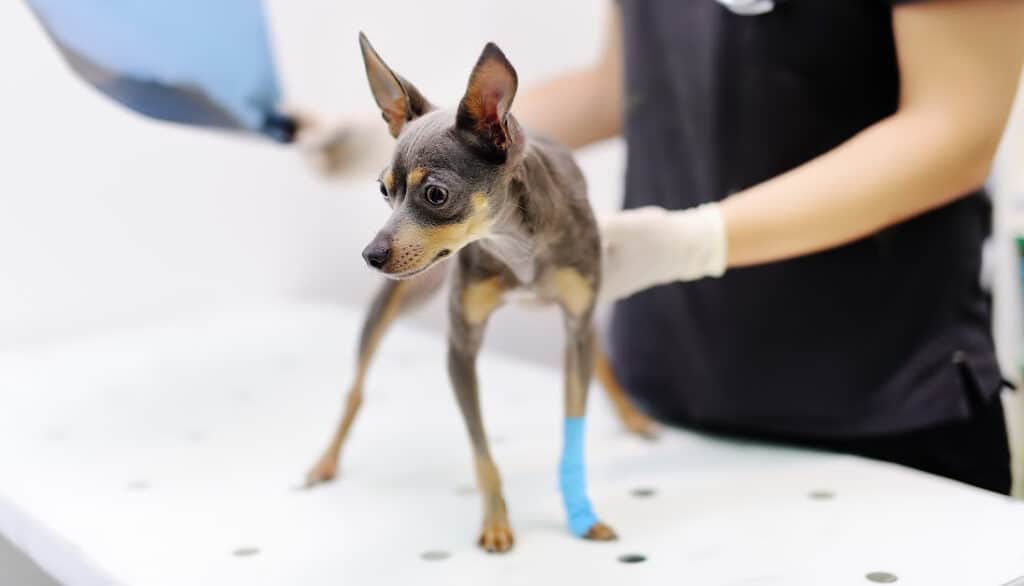
Factors to Consider Before Using Bactine on Dogs
When considering using Bactine on dogs, several factors need to be considered to ensure the safe application of this product. It’s important to carefully assess the situation and take appropriate measures before applying Bactine to a dog.
Here are some important factors to consider before using Bactine on dogs:
- Consult with a veterinarian: Before administering any treatment or medication to your pet, it’s always crucial to seek advice from a qualified veterinarian.
- Check for allergies: Dogs can have allergic reactions to various products, including Bactine. Performing an allergy test is advisable before applying the solution on your dog.
- Read label instructions: Always read the label instructions before applying any topical solution like Bactine on your dog.
- Observe the wound severity: Bactine might not be suitable for some types of wounds; hence it’s essential to determine if it suits the specific needs of your pet.
- Proper application: Whether it’s an open wound or a slight injury, proper application should be observed when using Bactine. Apply it in the recommended amount and frequency indicated in the label instructions.
Additionally, while using Bactine on dogs is possible, you should note that human drugs should not replace veterinary care. Regular visits to veterinarians are crucial to maintaining good health and identifying potential medical concerns early.

How Does Bactine Work on Dogs?
To understand how Bactine works on dogs, you need to know its three primary benefits: antiseptic, anesthetic, and pain relief. Applying Bactine on dogs can help you prevent infections, numb skin, and alleviate pain.
Bactine as an Antiseptic
Bactine is a powerful antiseptic that can be used on dogs to treat minor cuts, wounds and skin irritations. The active ingredient in Bactine is benzalkonium chloride, which kills bacteria and other harmful pathogens on contact. When applied to the affected area, Bactine quickly reduces pain and inflammation while accelerating the healing process. Its ability to clean and sterilize the wound makes it an effective solution for preventing infection.
Bactine also contains lidocaine hydrochloride which provides immediate relief from pain and itching. This unique combination of active ingredients makes Bactine a highly effective treatment for minor skin irritation in dogs. It’s important to note that Bactine should not be used on deep wounds or puncture wounds as it may lead to further complications.
When using Bactine on dogs, it’s important to follow proper application techniques and dosage guidelines. It should only be used externally, avoiding contact with the eyes and mouth of the dog. Additionally, it’s essential to check your dog’s condition regularly after applying Bactine to ensure there have been no allergic reactions or adverse side effects.
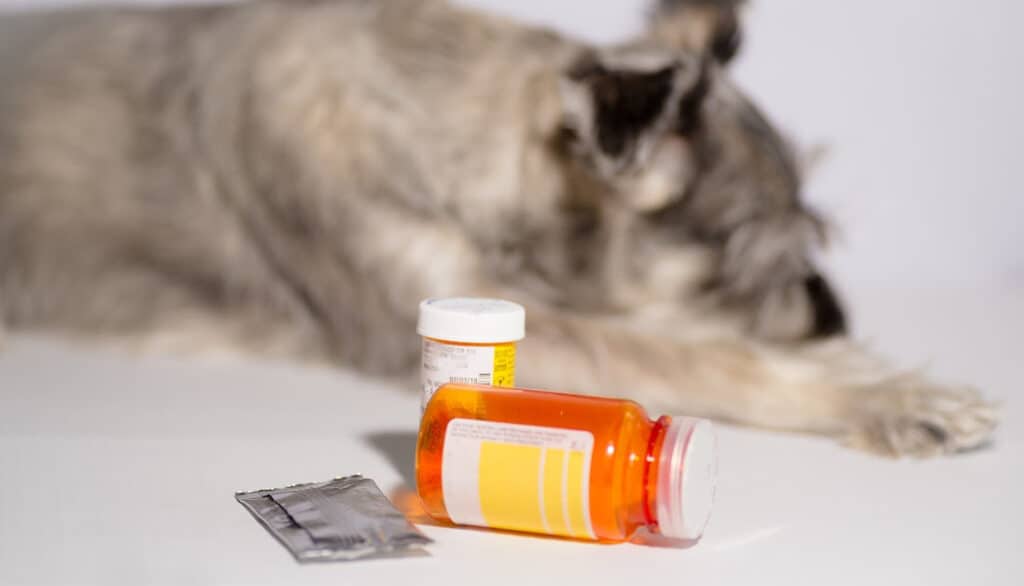
Bactine as an Anesthetic
Bactine has a numbing effect on dogs due to its anesthetic properties, which work by blocking nerve signals. This allows for pain relief and alleviates discomfort in dogs. Using Bactine on open wounds or injuries can also help prevent infection, as it contains antibacterial properties that help kill harmful bacteria. Additionally, Bactine is gentle enough to use frequently while still being effective, making it a versatile tool in managing dog injuries and discomfort.
Bactine as a Pain Reliever
Bactine acts as an effective pain reliever for dogs through its active ingredient, benzalkonium chloride. This disinfectant and topical analgesic work by blocking nerve signals responsible for transmitting pain. Its fast-acting properties provide immediate relief to minor cuts, burns, and insect bites, preventing dogs from constantly gnawing or licking the affected area.
Additionally, Bactine helps prevent infection by killing harmful bacteria on contact without stinging or causing further discomfort to animals. Its versatility and safety make it a popular choice among pet owners in managing their furry companions’ minor injuries.

Is Bactine Safe for Dogs?
To ensure the safety of your furry companion, you need to know whether Bactine is safe for dogs. In this part, you will find all the answers to your queries regarding the usage of Bactine on dogs. We’ll be discussing the potential risks of using Bactine on dogs, and when to avoid using Bactine on dogs to keep your pet healthy.
Potential Risks of Using Bactine on Dogs
Bactine on Dogs: Potential Risks and Precautions
The use of Bactine on dogs may pose several potential risks that pet owners should be aware of. This antiseptic spray contains benzalkonium chloride, which can cause skin irritation, allergic reactions, and toxicity if ingested by dogs.
Here are some possible risks to consider:
- Allergic Reactions: Benzalkonium chloride can trigger an allergic reaction in some dogs that may manifest as itching, redness, hives or swelling.
- Skin Irritation: Bactine may cause skin irritation and redness that could be painful for the dog. It can also dry out the skin over time.
- Toxicity: If your dog licks or swallows Bactine, it can lead to stomach upset, vomiting, diarrhea or even poisoning.
- Infection Spread: If you use Bactine to treat open wounds, it may have adverse effects on wound healing. The disinfectant nature of Bactine removes both good and bad bacteria from the wound site making room for further infections.
- Overdependence on Antiseptics: Overuse of antiseptics like Bactine may hamper a dog’s natural immunity system – especially when used on small cuts. This reliance could weaken your dog’s natural capability to fight infections.
It is important to note that every situation is unique, and what works well for one dog might not be suitable for another. Always consult your veterinarian before administering any medication or treatment to your pet.
In summary, while use of Bactine antiseptic spray on dogs can help sanitize them, this product poses several potential risks that should not go unnoted unless consulting professional consultation has been made beforehand.
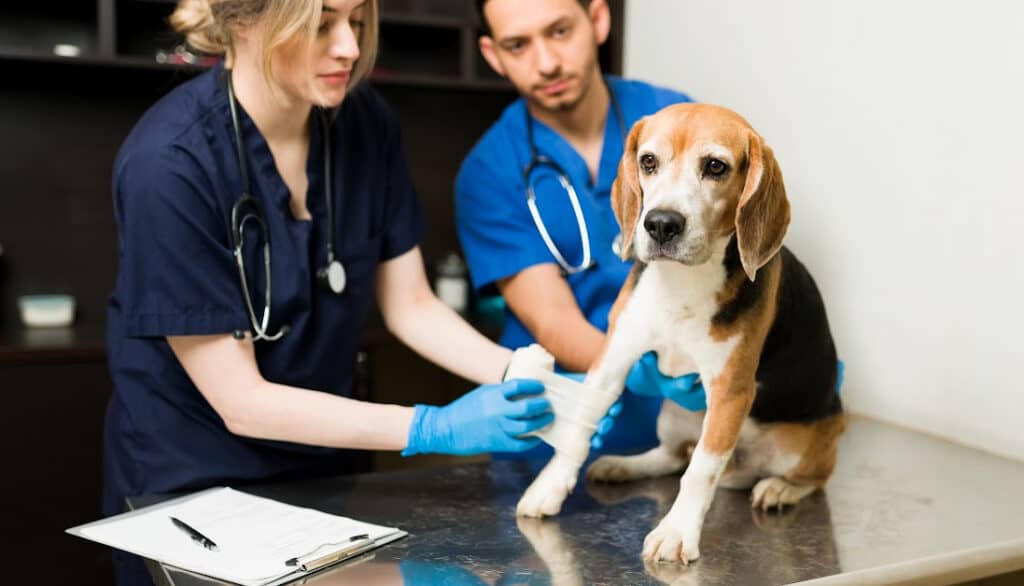
When to Avoid Using Bactine on Dogs
Using Bactine spray or ointment can help alleviate pain and prevent infections in pets. However, there are certain situations where it’s not recommended to use the product. Here is a 3-step guide describing when to avoid using Bactine on dogs.
- Avoid using Bactine if your dog has an open wound that is bleeding profusely. Bactine can make blood clotting more difficult, causing more harm than good.
- Adversely, do not apply Bactine if the wound is too small and completely healed; spraying unnecessary chemical substances onto your furry friend’s skin may do more bad than good.
- If an allergic reaction or rash occurs after applying the product, stop its use immediately and reach out to a vet for further advice.
It’s essential to note that dosing guidelines given by licensed veterinarians must be followed when applying any medicine/supplement/spray/ointment on your pet – taking care of our furry friends’ wellbeing should always be prioritized.

Alternatives to Bactine for Dogs
To find solutions for wounds on your furry friend, explore alternatives to Bactine for dogs with natural remedies, antiseptic solutions, and seeking advice from a vet. These sub-sections offer options for keeping your dog’s wound clean and promoting healing while avoiding potential side effects of Bactine or unsuitable alternatives.
Natural Remedies for Wound Care on Dogs
Wound care is essential to ensure your furry friend’s speedy recovery. Pet owners may consider replacing traditional treatment options with natural remedies for effective wound care. These remedies can aid in treatment, reduce pain and eliminate the risk of infection.
- Herbs such as calendula and comfrey can be brewed into a tea and applied to wounds directly.
- Honey has healing agents that are anti-inflammatory and antibacterial.
- Aloe vera gel has therapeutic properties and can cool the skin while treating wounds.
Using natural remedies is an effective alternative to traditional antibiotics as it eliminates potential side effects caused by harsh chemicals. However, it is important to understand that severe cases warrant professional veterinary attention.
Pet owners should exercise caution and diligent care when treating their pets’ wounds as they need time to heal properly without interruption. If done correctly with the use of natural remedies, your loyal companion will soon regain its health and well-being.
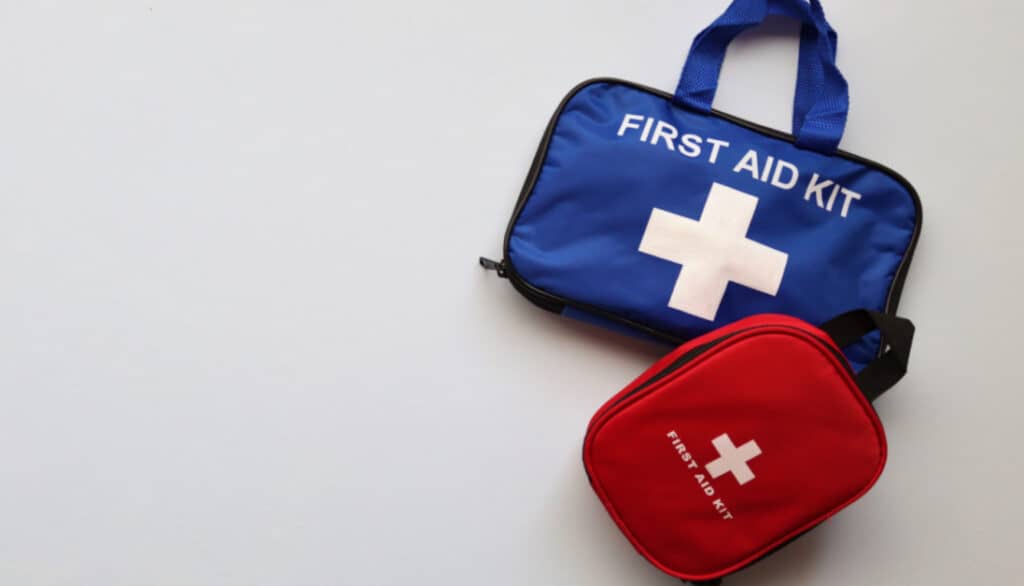
Other Antiseptic Solutions for Dogs
For pet parents, it’s crucial to know the best antiseptic solutions to treat their furry friend’s wounds and injuries. Apart from Bactine, there are a few other antiseptic solutions that can help dog owners heal minor cuts and scrapes at home.
Here are some of them:
- Betadine Solution: This is an effective antiseptic solution that works well against bacteria, fungi and viruses. With its strong antimicrobial properties, Betadine is useful in treating insect bites, hot spots and minor wounds.
- Chlorhexidine Solution: Chlorhexidine’s broad-spectrum disinfectant properties make it an excellent choice to treat superficial cuts, abrasions, and skin infections. It can also be used as a mouthwash to improve overall oral hygiene.
- Hydrogen Peroxide: This mild antiseptic solution can be used safely on dogs when diluted with water in the right quantity. When applied topically, hydrogen peroxide releases oxygen that helps kill bacteria and clear debris from the wound.
- Povidone Iodine Solution: Another great alternative to Bactine, this powerful yet cost-effective antiseptic is often recommended by veterinarians for treating open bruises or puncture wounds. Povidone iodine solution effectively eliminates common germs like staphylococci.
- Witch Hazel Solution: With anti-inflammatory effects and astringent properties, witch hazel holds benefits for both humans and animals alike. It cools down skin irritations quickly while reducing redness and swelling in one go.
- Saline Solution: Saltwater or saline solution makes a simple but effective natural cleanser for lacerations. A little salt dissolved into lukewarm water creates an environment where germs may not thrive easily.
When choosing the best antiseptic solution for your dog, always check with a vet or animal health specialist first. It’s not uncommon for untreated wounds to develop complications like infection or sepsis, which can lead to severe health risks. Therefore, it is advised that you take medical consultation before trying any of these remedies.
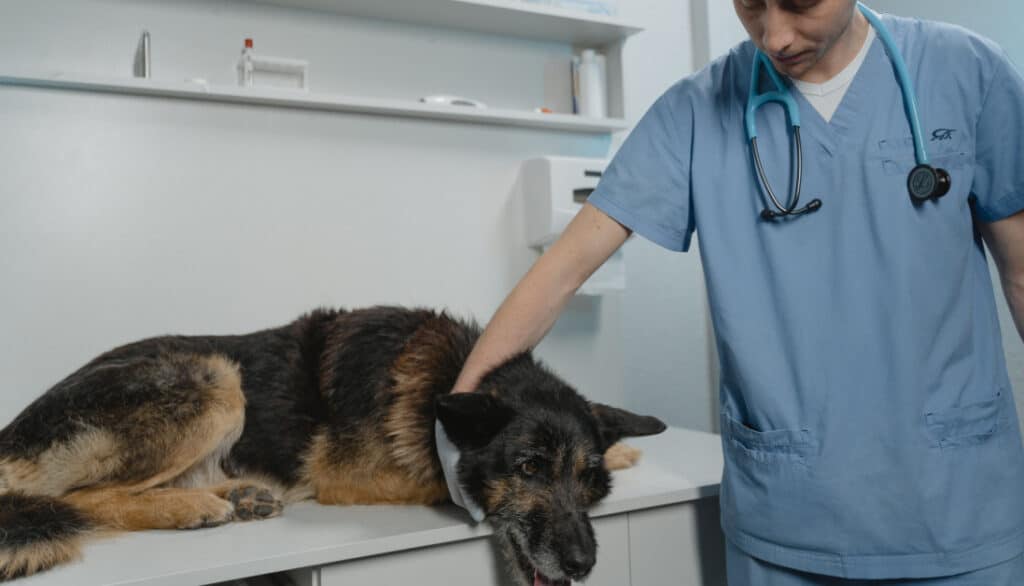
Consulting a Vet for Suitable Alternatives
When looking for alternatives to Bactine for dogs, it is essential to seek guidance and recommendations from a veterinary professional. Suggestions from vets can ensure that the used product will not cause harm or interfere with existing medication. Speaking with a vet aids in receiving proper guidance on suitable wound care products.
Vets recommend consulting for available topical based treatments that have been approved by veterinary authorities. A vet may suggest treatment options, such as betadine, antibacterial sprays, or even medicated shampoos depending on the nature of the wound and its severity. These treatment alternatives can help heal wounds while inhibiting bacterial growth and reducing infection risks in dogs.
Paying attention to individual pet requirements is vital when exploring different product substitutes for Bactine. A veterinarian can give specific advice on what ingredients may be harmful to specific dog breeds. By discussing symptoms and signs of allergies or adverse reactions to particular substances beforehand, owners can receive recommendations on suitable alternative products that best cater to their dog’s needs.

Tips for Proper Wound Care on Dogs
To care for your furry friend’s wounds appropriately, you need expert tips on wound care with Bactine. In order to heal your dog’s wounds without complications, you must start by cleaning the wounds. You also need to use appropriate wound products and take preventive measures for wound infections.
Cleaning of Wounds
To maintain the health of an injured dog, proper hygienic measures must be followed. One of the essential steps is the adequate cleaning of wounds to avoid possible infections and complications.
To clean the wound effectively, follow these four steps:
- Take some warm water and dilute an antibacterial soap as per instructions.
- Gently pour the solution onto the affected area and allow it to soak in for a minute or two.
- Rinse well with clean water and pat dry with soft cloth or gauze.
- If necessary, apply antiseptic cream or ointment recommended by a veterinarian.
Apart from these basic measures, it is crucial to understand that not all wounds can be appropriately treated at home. Seek veterinary care if there are signs of excessive bleeding, swelling, foul odour, redness or discharge from the injury site.
Infections are more common in deep or puncture wounds than in surface cuts. Therefore, do not neglect even minor injuries and seek appropriate medical attention immediately.
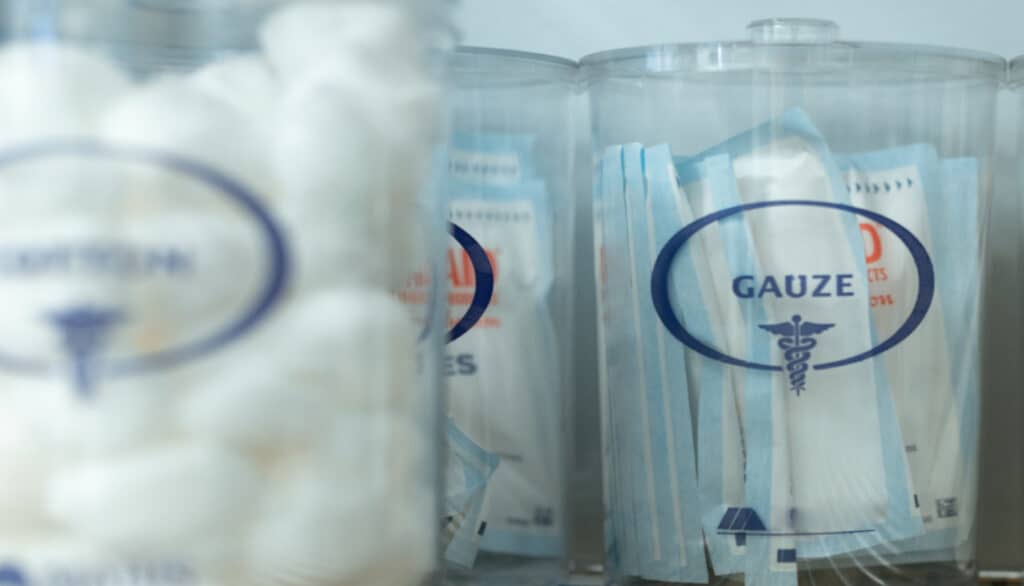
Use of Appropriate Wound Products
Wound care on dogs requires the use of appropriate products that aid in healing and prevent infections. Using the correct wound products for dogs ensures efficient healing, proper pain relief and decreases the risk of complications.
- Antiseptic solutions such as chlorhexidine, povidone-iodine, and hydrogen peroxide can effectively clean wounds.
- Wound dressings such as non-stick pads or Telfa allow for air flow while preventing dirt and debris from entering the wound.
- Vet-prescribed topical creams or ointments can help expedite healing with their antibacterial properties.
It is important to monitor wounds regularly to ensure adequate care is provided throughout the healing process. Additionally, consulting a veterinarian before applying any product on an animal’s wound is always advised to ensure it won’t cause any further harm or complications.
Preventative Measures for Wound Infections
Taking proactive measures to prevent wound infections is crucial for your furry friend’s health and well-being. Here are some tips to help you prevent such infections:
- Keep the wound area clean and dry, and regularly inspect it for any signs of redness, swelling or discharge.
- Use an antiseptic solution recommended by your veterinarian to clean the wound before applying any dressing or antibiotic ointment.
- Prevent your dog from licking or biting the wound by using a cone collar or bandage, as saliva can introduce bacteria that increases the risk of infection.
- Monitor your dog’s behavior after surgery or injury, watch out for excessive scratching, chewing, or pawing at the wound site.
It’s not enough to simply treat wounds when they occur. Providing proper care and attention can keep infections at bay, reduce complications and promote faster healing for your canine companion. Remember that prevention is key in maintaining good health!

Conclusion
To wrap up, rest assured that you now have a solid understanding of whether or not you can use Bactine on dogs. In conclusion, we have discussed the expert opinion on the matter and shared our final verdict on using Bactine on dogs. Additionally, we have emphasized the importance of proper wound care for dogs, which is essential for the overall health and well-being of your furry friend.
Final Verdict on Using Bactine on Dogs
After careful consideration, it is not recommended to use Bactine on dogs without consulting a veterinarian first. Although it may be effective in treating minor cuts and scrapes, there are better options available that are specifically formulated for use on animals. Additionally, using human medications on pets can have adverse side effects and may worsen the condition.
Moreover, pet owners should always prioritize their dog’s health and safety over convenience. There are many antiseptic sprays and ointments available that are specifically designed to treat wounds in dogs without causing harm. When in doubt, it is always best to seek advice from a licensed veterinarian.
It is imperative to note that every pet’s health condition varies; thus, one must exercise caution while purchasing medication or administering any drug. It is crucial not to self-medicate your pet because improper treatment could lead to fatal consequences. Instead, visit a vet or consult with an expert practitioner who can provide adequate treatment for your furry friend.
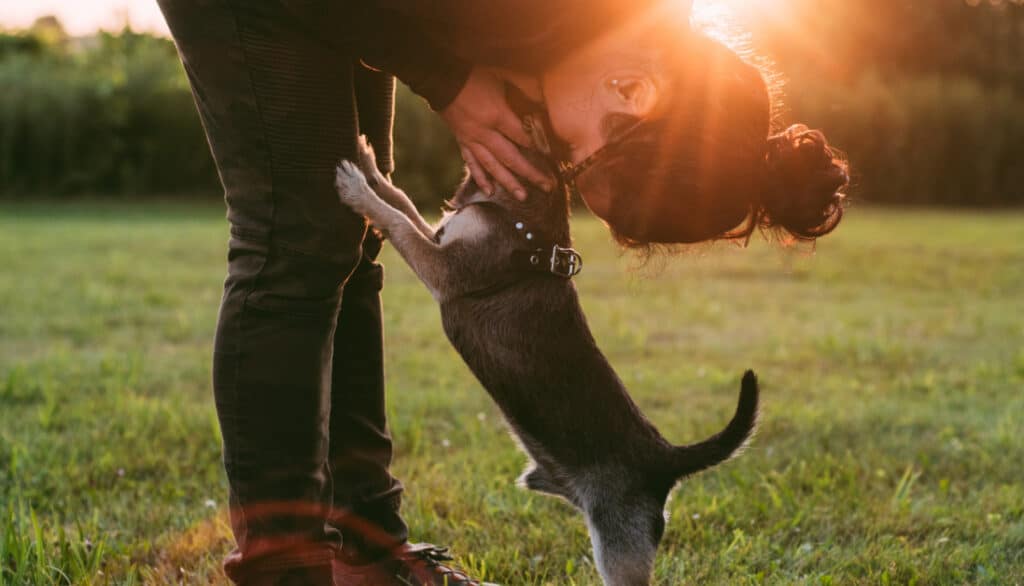
Importance of Proper Wound Care for Dogs
Proper wound care is vital for the health and well-being of our furry companions. By tending to their injuries promptly, we prevent infections and avoid more severe health issues. Also, regular checkups with a veterinarian can help identify potential problems early on. Injuries on paws and ears are particularly prone to develop into infections if left untreated, so it’s important to seek medical attention immediately if you notice any lacerations or abrasions in these areas.
It’s not just about treating dogs’ physical wounds; psychological healing is also necessary. Dogs who experience trauma from getting into fights or accidents may require professional therapy or training to regain their confidence and trust in humans. Additionally, proper nutrition plays a key role in aiding in the recovery process, as well as maintaining overall well-being.
Overall, ensuring we take care of our dogs’ wounds properly will prevent complications from occurring and improve their quality of life. Let’s prioritize wound care for our furry friends to ensure they live happy and healthy lives.
~ Sheena
Frequently Asked Questions
A: Yes, Bactine can be used on dogs to clean and treat minor cuts, scrapes, and insect bites.
A: Apply Bactine on a clean cotton ball or pad and gently rub over the affected area of the dog’s skin. Do not spray directly on the dog’s fur or in its eyes.
A: It is not recommended for dogs to ingest Bactine, but if they happen to lick it off their skin, it should not cause harmful effects.
A: Bactine is only recommended for minor skin irritations, cuts, scrapes, and insect bites. It should not be used for more serious or chronic skin conditions in dogs.
A: Some dogs may experience mild irritation or redness after using Bactine, but this is rare. If any adverse reactions occur, discontinue use and consult a veterinarian.
